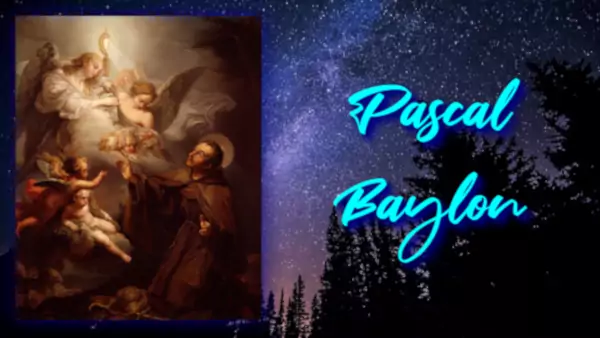Pascal Baylon was born in Spain in Aragon, in a household of modest farmers, Martin Baylon and Isabelle Jubera. As a child, he shows a great attraction for the church, where his mother leads him, and stays long hours in prayer in front of the tabernacle. His parents place him as a shepherd. Guarding his animals, he prayed unceasingly, with a particular devotion for the Blessed Virgin.
At the age of 20, he wishes to join the monastery of the discalced Friars Minor . But, barely knowing how to read and write, he is not accepted into the religious community. So he hired himself as a shepherd, near the monastery, in order to hear the sound of the office hours and to pray at those times. Finally, in 1564, the brothers accepted him as a lay brother, and he was a porter for a long time. There, he practiced permanent charity towards those who presented themselves, going so far as to offer them flowers from the garden if they had nothing else. In the face of the reproaches of his superiors, he replies: "If he presents himself as twelve poor people and I give to ten, it is to be feared that one of those I send away is precisely Jesus Christ".
In spite of his modesty, many people came to him for advice and all noticed his permanent availability and good humour. At the same time, Brother Pascal spent long moments in adoration before the Eucharist, immersed in a deep ecstasy.
One day, he received the order to go to France, to the general of his order, Christophe de Cheffontaines. He thus left for Paris. The road is as long as it is perilous, especially in this time of conflict with the Huguenots. He was wounded in a skirmish, but he forgave his aggressors immediately. He then returned to Spain, and ended his life in the convent of Notre-Dame-du-Rosaire, in Vila-real near Valencia, where he died. A basilica was then built and guards his sepulchre.
Buried in the royal chapel of Vila-real, his tomb immediately became an object of pilgrimage. Beatified by Pope Paul V in 1618, he was canonized by Alexander VIII on 16 October 1690. 40 years before he was canonized, a native Guatemalan claimed to have an apparition of Pascal Baylon, appearing in the form of a clothed skeleton. This event became the basis of the heterodox tradition of San Pascualito.








